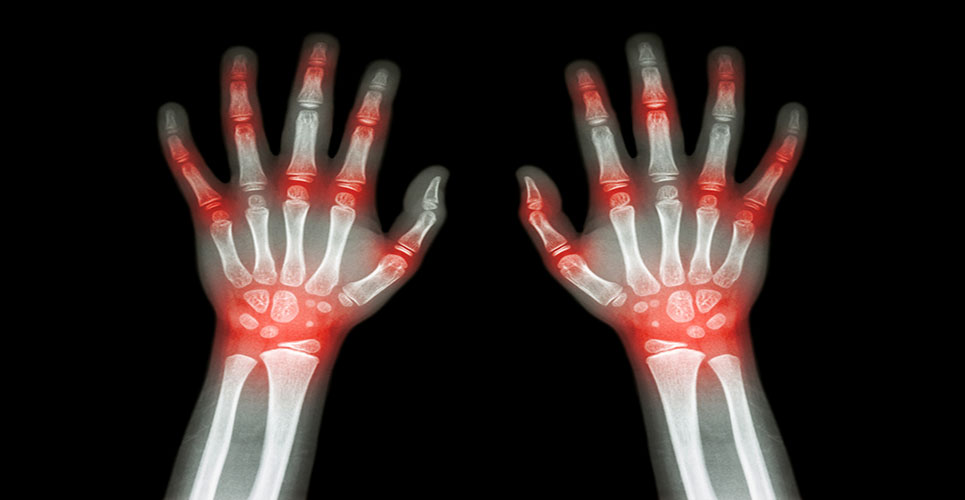teaser
Bristol-Myers Squibb Company (NYSE: BMY) has announced the results of year two data from AMPLE (Abatacept Versus Adalimumab Comparison in Biologic-Naïve rheumatoid arthritis (RA) Subjects With Background Methotrexate), a first-of-its-kind trial of 646 patients comparing the safety and efficacy of the subcutaneous (SC) formulation of abatacept versus adalimumab, each on a background of MTX, in biologic naïve patients with moderate to severe RA.(1)
The AMPLE year two data was presented at the European League Against Rheumatism (EULAR) Annual European Congress of Rheumatology and highlighted during a congress press conference.
Results from the second year of the AMPLE study reiterate the year one data confirming comparable efficacy of abatacept plus MTX compared with adalimumab plus MTX (60%) based on ACR20 (American College of Rheumatology 20% improvement). ACR50, 70, and 90, considered to be more stringent measures of efficacy, as well as DAS-28-CRP, also were assessed over 24 months and found to be similar between the two arms.(1) Onset of response was similar between the two groups, as was radiographic progression, with 85% of patients on abatacept plus MTX and 84% of patients on adalimumab plus MTX achieving radiographic non-progression at two years.(1)
The one year AMPLE data met its primary endpoint as measured by non-inferiority of ACR20. abatacept plus MTX achieved comparable rates of efficacy vs. adalimumab plus MTX at year one (64.8% versus 63.4%, respectively).(2)
Dr Andrew Östör, Consultant Rheumatologist at University of Cambridge, said: “Rheumatoid arthritis is a debilitating disease which seriously impacts patient quality of life. Following the recent launch of SC abatacept patients have access to a choice of treatment options, and it is encouraging to have robust longer-term head-to-head data evaluating efficacy and safety of two of these biologic treatments.”
At 24 months, overall safety data was similar for abatacept plus MTX and adalimumab plus MTX, including incidence of adverse events (92.8% versus 91.5%), serious adverse events (13.8% versus 16.5%), and malignancies (2.2% vs 2.1%). Discontinuations due to adverse events were 3.8% for abatacept plus MTX compared to 9.5% for adalimumab plus MTX, while discontinuations due to serious adverse events were 1.6% for abatacept plus MTX compared to 4.9% for adalimumab plus MTX.(1)
Injection site reactions were reported in 4.1% of patients taking abatacept plus MTX and 10.4% of patients taking adalimumab plus MTX.(2) Autoimmune events were reported in 3.8% of patients in the abatacept plus MTX group and 1.8% of patients in the adalimumab plus MTX group. All of these autoimmune events were mild or moderate in severity.(1)
About the study
AMPLE is a phase IIIb randomised, investigator-blinded multinational study of 24 months duration with a 12 month efficacy primary endpoint (non-inferiority for ACR20).(1,2) The study included 646 adult biologic-naïve patients with active moderate to severe RA and inadequate response to MTX; 318 in the abatacept SC plus MTX group and 328 in the adalimumab plus MTX group.(1)
Patients were stratified by disease activity and randomised to either 125 mg abatacept SC weekly or 40 mg adalimumab every other week, both on background MTX.(1) The primary endpoint was to determine non-inferiority of abatacept SC plus MTX to adalimumab plus MTX based on ACR20 response at 12 months.(2) Secondary endpoints included injection site reactions,(2) radiographic non-progression as assessed using the van der Heijde modified total Sharp score (mTSS) method, safety and retention.(2) The complete year one study results were published in the January 2013 volume of Arthritis & Rheumatism, the official monthly journal of the American College of Rheumatology.(2)
References
- Bristol-Myers Squibb Data on File. EULAR13-2689 Abstract: “Head-to-Head Comparison of Subcutaneous Abatacept Versus Adalimumab on Background Methotrexate in RA: Two Year Results from the AMPLE Study.” To be presented at the EULAR Annual Congress, June 12-15, 2013.
- Weinblatt et al. Arthritis Rheum. January, 2013; 65(1): 28-38.

